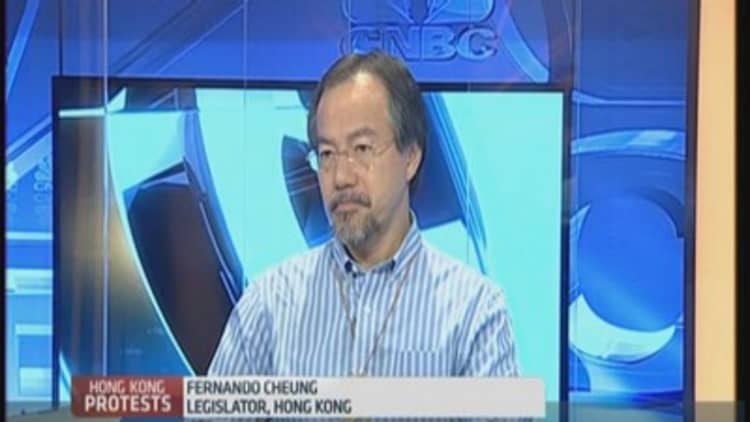Despite efforts to clear the protesters in Hong Kong, university student Joshua Lee still roams the occupied areas in the city's central business districts. Like many young people supporting the movement, Lee is wary of closer ties between Hong Kong and Beijing.
"A lot of people share the same thoughts as I do," he said outside a tent in a part of the city known as Admiralty. "They also worry about the economic problems brought by the Chinese coming in."
Hong Kong faces a paradox: the city has gained greatly from its links with China, but has reason to fear further integration as China advances politically and economically. As a result, its relationship with Beijing is at its most tense since the city's handover in 1997 from the U.K. The grassroots campaign is meant to give Hong Kong's people greater say in the city's destiny.
Political freedom
Lee joined the protests not only to fight for his political freedoms, but also his economic future.

"There is very fierce competition in Hong Kong," Lee said, noting that when Mainland Chinese buy houses it Hong Kong it pushes prices up leaving normal Hong Kong citizens unable to afford housing.
Hong Kong's housing market is among the world's most expensive. Average home prices stood at 14.9 times gross annual median household income in 2013, the Demographia International housing Affordability Survey published at the beginning of 2014 showed. The survey listed Hong Kong as the most unaffordable city to buy property globally. Much of the price rise has been attributed to strong demand from Mainland Chinese buyers.
"We want to vote for somebody who can [represent] us," he said, "[someone] who can fight for us [and] can make policies that are favorable for us rather than the Chinese."
After Hong Kong returned to Chinese rule in 1997, the former British colony was promised universal suffrage by 2017. China's leadership recently announced that meant Hong Kong citizens could vote for their own leader - but only among candidates vetted by Beijing. That decision sparked widespread demonstrations that culminated around Chinese National Day, October 1. Nearly two months later, the protesters continue to block important thoroughfares in the city.
Read MoreIs HK's Umbrella Revolution coming to an end?
Too interconnected to change?
Starry Lee, a pro-Beijing lawmaker in Hong Kong, believes the students have made their point and should allow the international financial center to return to normal. Lee, the vice chair of the Beijing friendly Democratic Alliance for the Betterment and Progress of Hong Kong, said Hong Kong's future is inexorably linked to mainland China and its future lies in adapting to that reality.
"Why Hong Kong is a success of the past and hopefully in the future is that we find our role to China's development," she said. "We in Hong Kong have to find our own role and our own position to help the whole modernization of China."
Hong Kong has been able to help China modernize in large part because of its distinct status from the mainland. Under the framework of one country two systems Hong Kong has maintained the regulations, civil liberties and rule of law that it had under the British. International investors trust Hong Kong as a gateway to China.
China's growing shadow
Joshua Lee worries Hong Kong could cede its competitive advantage to a rising China if its unique identity erodes.
Read MoreHong Kong's revolution: Post-it notes & smartphones
"We want to tell the Beijing government that what we really want is freedom," he said. "We don't want to be another normal city in China."
Longtime resident and district councilor Paul Zimmerman has come out in support of the pro-democracy protests, holding up a yellow umbrella – umbrellas came to symbolize the movement as protesters used umbrellas to shield themselves from tear gas – at an official National Day event. He believes the demonstrations help Hong Kong maintain the distinctiveness that has been a source of its prosperity.
"It reinforces Hong Kong as a free spirited market [and] as a market of creativity of talented people, people willing to speak their minds where transactions can be done quickly," Zimmerman said. "That is what people get in London and New York. That is what they get in Hong Kong."


